Fashion’s finest moments at Milan Design Week 2023: Loewe to Fendi
Scarlett Conlon charts all the fashion happenings at Milan Design Week 2023 – from furniture and homeware collections to high-profile launches and collaborations
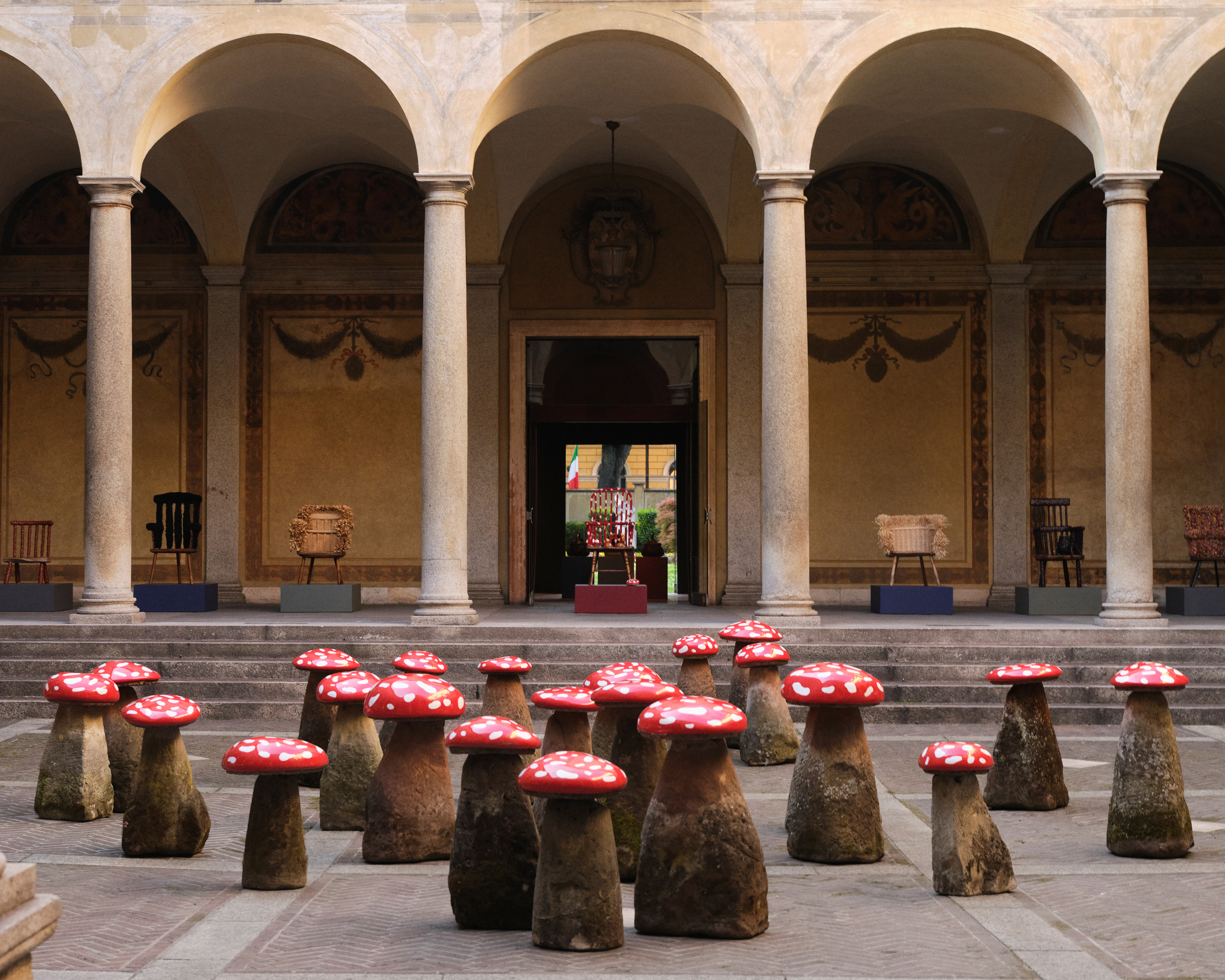
Order resumed in Milano last week (18 – 23 April) as Salone del Mobile and Milan Design Week returned to their spring calendar slot, the queues as long as the sun was hot. With the intersection between fashion, craft and architecture an ever-increasing sweet spot for brands to flex their collaborative muscle, the fashion industry was also out in force to celebrate it.
Bottega Veneta enlisted the esteemed Gaetano Pesce – its recent show-set collaborator – to take over its Via Montenapoleone store with a draped-resin grotto; Dior invited Philippe Starck to expand on his inaugural 2022 ode to the world of couture; Giorgio Armani opened up his exquisite Via Borgonuovo HQ for the first time to the public; and Etro revealed the fruits of creative director Marco di Vincenzo’s Insta-affinity with the artist Amy Lincoln.
Here, in our comprehensive round-up, the Wallpaper* edit of the best fashion moments at Milan Design Week 2023.
Best of: fashion brands at Milan Design Week 2023
Fendi Casa

Fendi Casa pulled out the stops for Salone this year as it unveiled nearly a dozen new designs riffing off its distinctive DNA that fuses an intangible cosiness into its elegant compositions. Alongside additions to its Toan Nguyen-designed ‘Totu’ collection, the new ‘Peekasit’ sofa and ‘Blow Up’ modular seating designed by Gabriele Chiave, the ‘Taiko’ sofa designed by Piero Lissoni, the ‘Icaro Table’ by Dimorestudio, the ‘Ottavia’ chairs by Cristina Celestino, and two new carpets, came the Louis Poulsen collaboration that got everyone talking. The legendary Dane’s ‘Artichoke ’pendant lamp was reimagined in metal featuring the Fendi logo and in yellow glass, evoking the shade so synonymous with the Roman fashion house. Joining them, the ‘PH’ floor light and ‘PH’ table lamp were Fendi-fied with a golden bronze finish and yellow diffuser. Presented with a buzzing cocktail in the brand’s Piazza della Scala flagship, the Dutch designer Joost van Bleiswijk recreated the Roman arches of Fendi’s Eternal City HQ for the window display. ‘The flexibility of the elements conveys a sense of elegance and beauty,’ says Bleiswijk. ‘It’s my homage to a company that embodies the same qualities.’
Jimmy Choo
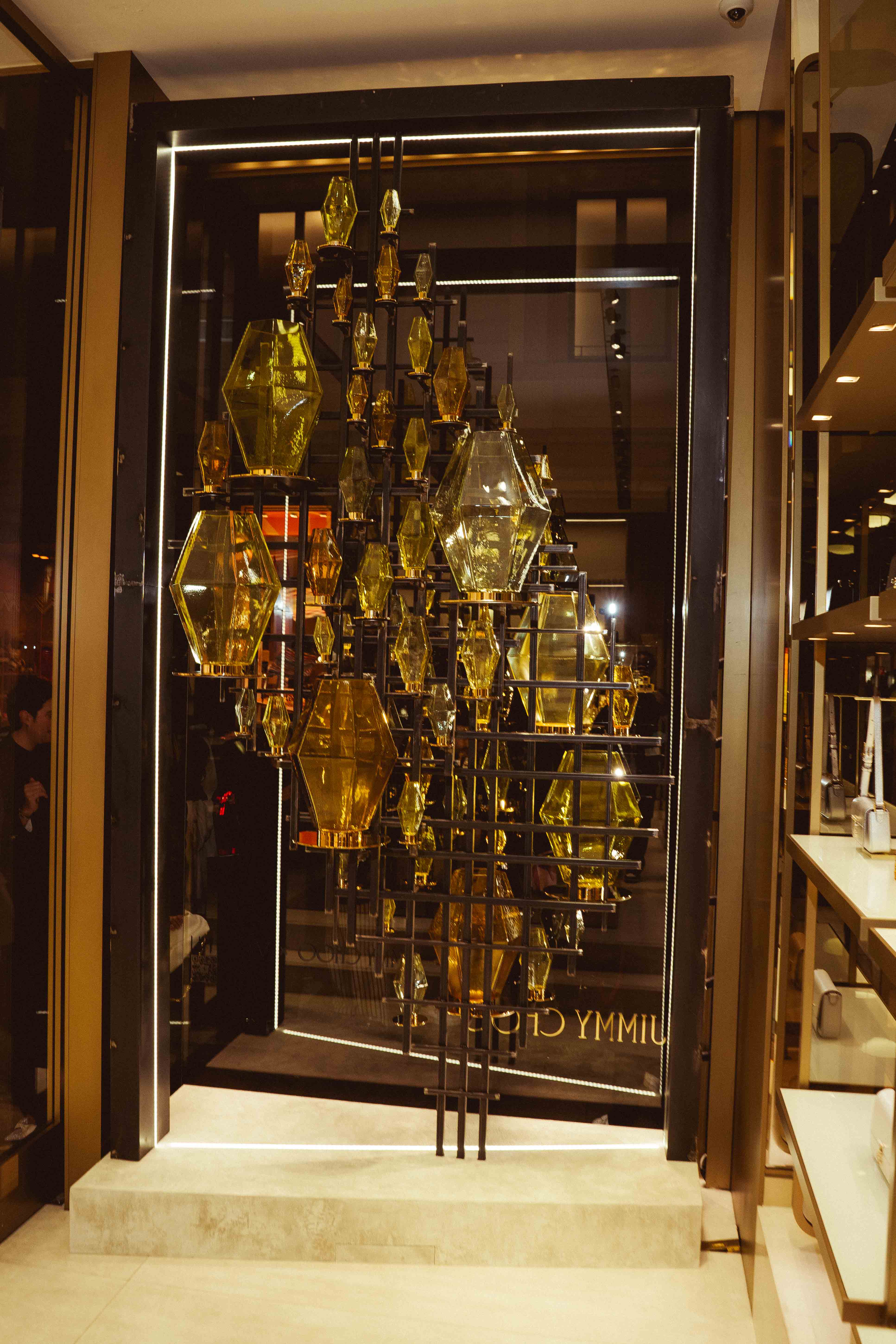
Both revered for their respective brands’ contours and handmade craft, Jimmy Choo creative director Sandra Choi and Venini art director Marco Piva put their heads together to craft four new vases inspired by the shoe brand’s diamond chain incorporating the Murano glass experts’ Poliedro model. ‘Having the opportunity to work with Marco Piva reinforces our commitment to the highest quality of materials, Italian craftsmanship, blended with timeless design,’ Choi told Wallpaper*. ‘The diamond is key for Jimmy Choo due to its multifaceted nature, with its power to bring light, transform and shine bright. Through our collaboration we can now bring this joy and optimism into people's home or workspace.’ Hand crafted at Venini’s prestigious Murano factory, the vases took pride of place at Jimmy Choo’s Via Sant Andrea in Milano, refracting the light in dark and light green as well as yellow and amber.
Stone Island
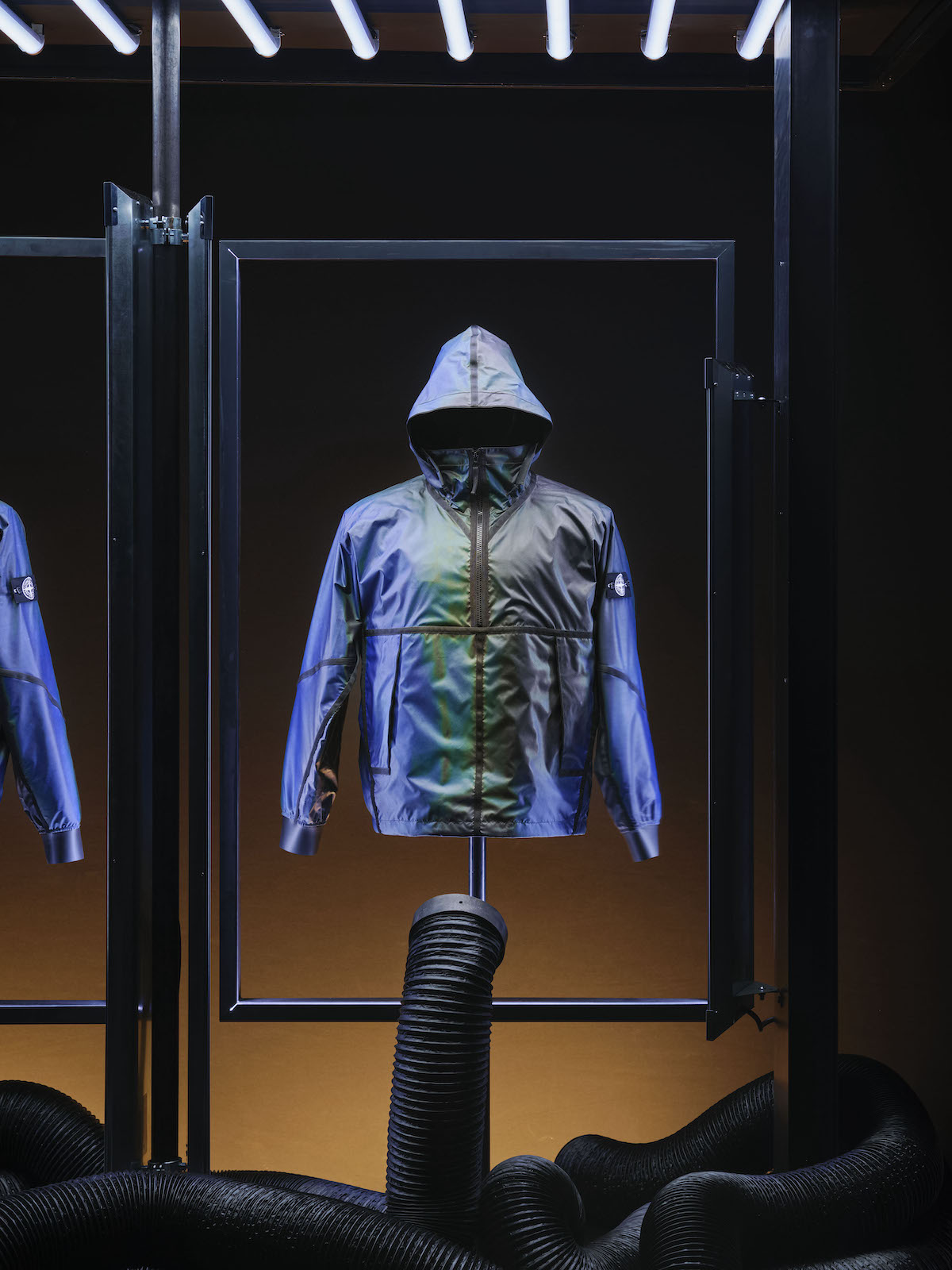
Series 7 of Stone Island’s Prototype Research Series unveiled a thermochromic technology that saw nylon-canvas coated with ‘helical-shaped cholesteric liquid crystals ink’ that reacts to an increase in temperature by becoming multiple variations of iridescent surface decoration. Coined ‘Liquid Crystal Heat Reactive’, the material innovation has been tested between 15 and 21 degrees celsius which delivers a spectrum of shades that take a black base at room temperature, to yellow to green to (with a little more heat) blue. As always, the collection of garments was made in an extremely limited edition of 100 pieces, which are more likely to be admired than worn – but that is also the point. Developed at the brand’s own R&D hub in collaboration with the British design duo and textile specialists Sara + Sarah, Stone Island’s material experimentation is paving the way for a new perspective on how we engage with the materials that we wear and which surround us.
Fila
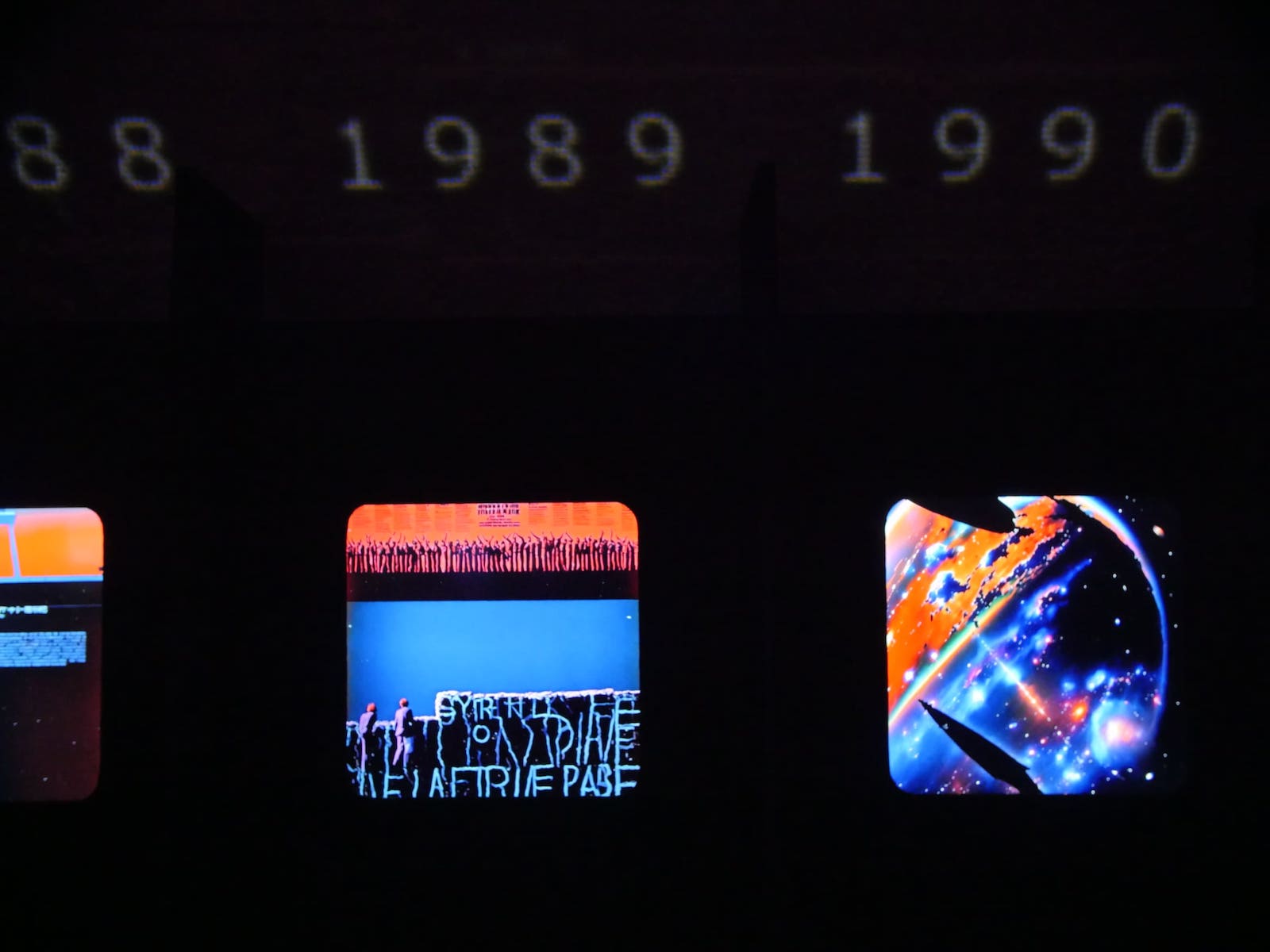
Celebrating 50 years of its iconic ‘F-box’ logo, Fila employed AI to interpret it into what it called ‘a vector of facts and images, to create a visual and auditory experience’. Launched in the tunnels on Via Sammartini, the installation – entitled ‘Reading The Fila F-Box: The AI Experience’ – looked to the brand’s rich sporting past that Enrico Frachey, Pierluigi Rolando and Sergio Privitera incepted back in 1973 to break down the logo that has become subliminally associated with everything from ski slopes and mountaineering to the whites of Wimbledon. The idea behind morphing the logo, relayed the brand, was to highlight its constant reinvention and relevance, ‘a symbol of innovation and endless change, but also of balance’.
Wallpaper* Newsletter
Receive our daily digest of inspiration, escapism and design stories from around the world direct to your inbox.
Valextra
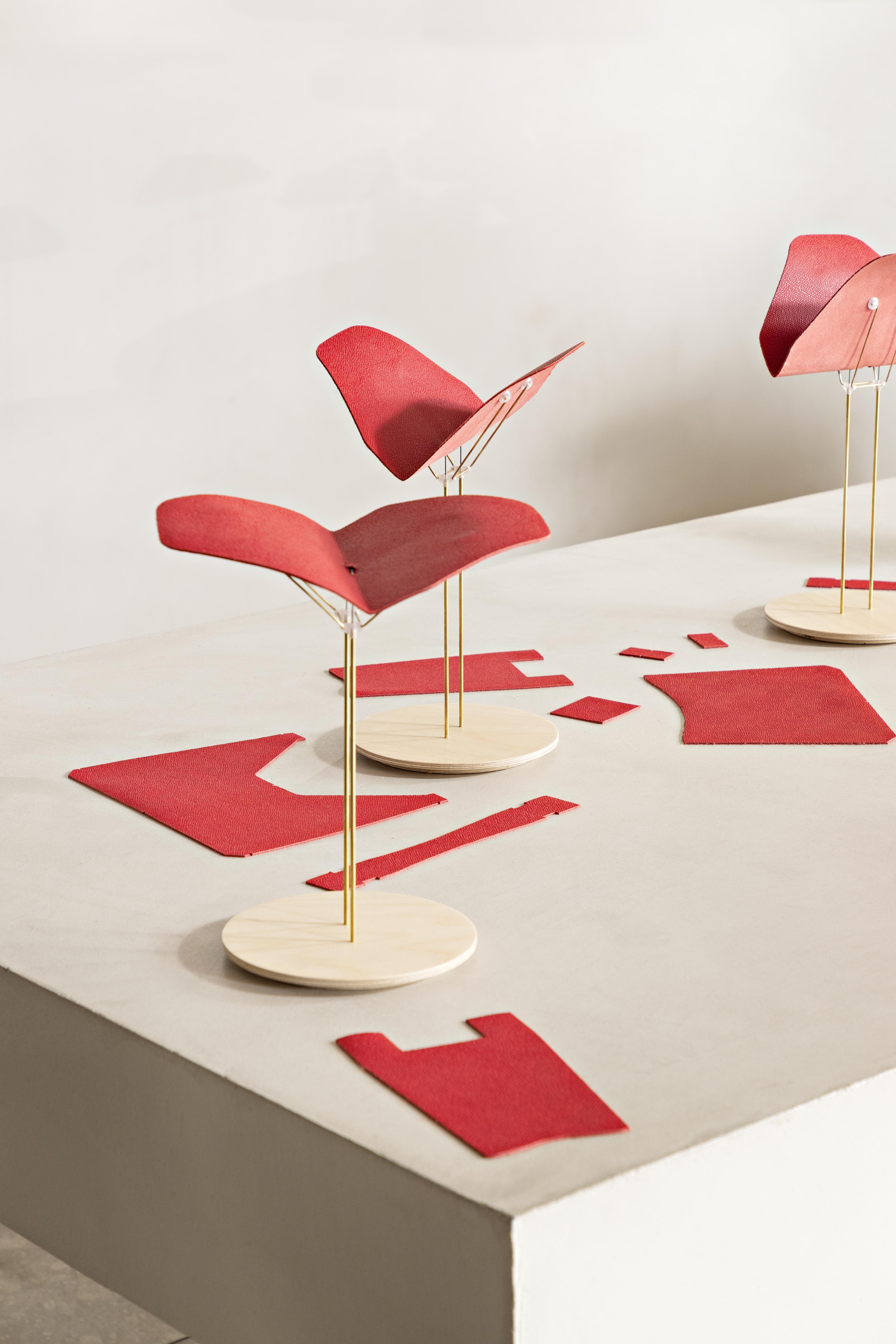
As an ode to its engineering foundations, Valextra worked with London-based design studio Isabel + Helen to create a kinetic installation showcasing its time-honed tools and techniques. Staged in the brand’s John Pawson-designed Via Manzoni flagship, ‘The Rhythm of Valextra’ comprises a circular construction featuring the brushes used to hand paint the distinctive black lacquered ‘Costa’ edging that frames every bag, the scissors that cut its leather and the patented twist-lock clasp of its best-selling ‘Iside’ handbag. In doing so, the brand returns its tools to the atelier in homage to its very first boutique on Piazza San Babila whereby its showroom and shop existed in the same space, presenting its process and product side by side. ‘The full sculpture represents each step of making a Valextra bag, tiered to show the stages, with the final piece coming together on the top layer,’ say the designers, Isabel Gibson and Helen Chesner. ‘The circular tiers create infinite cycles of the different processes, each repeated when the next bag is made. It’s a rhythmic visual production line of sorts.’
Versace
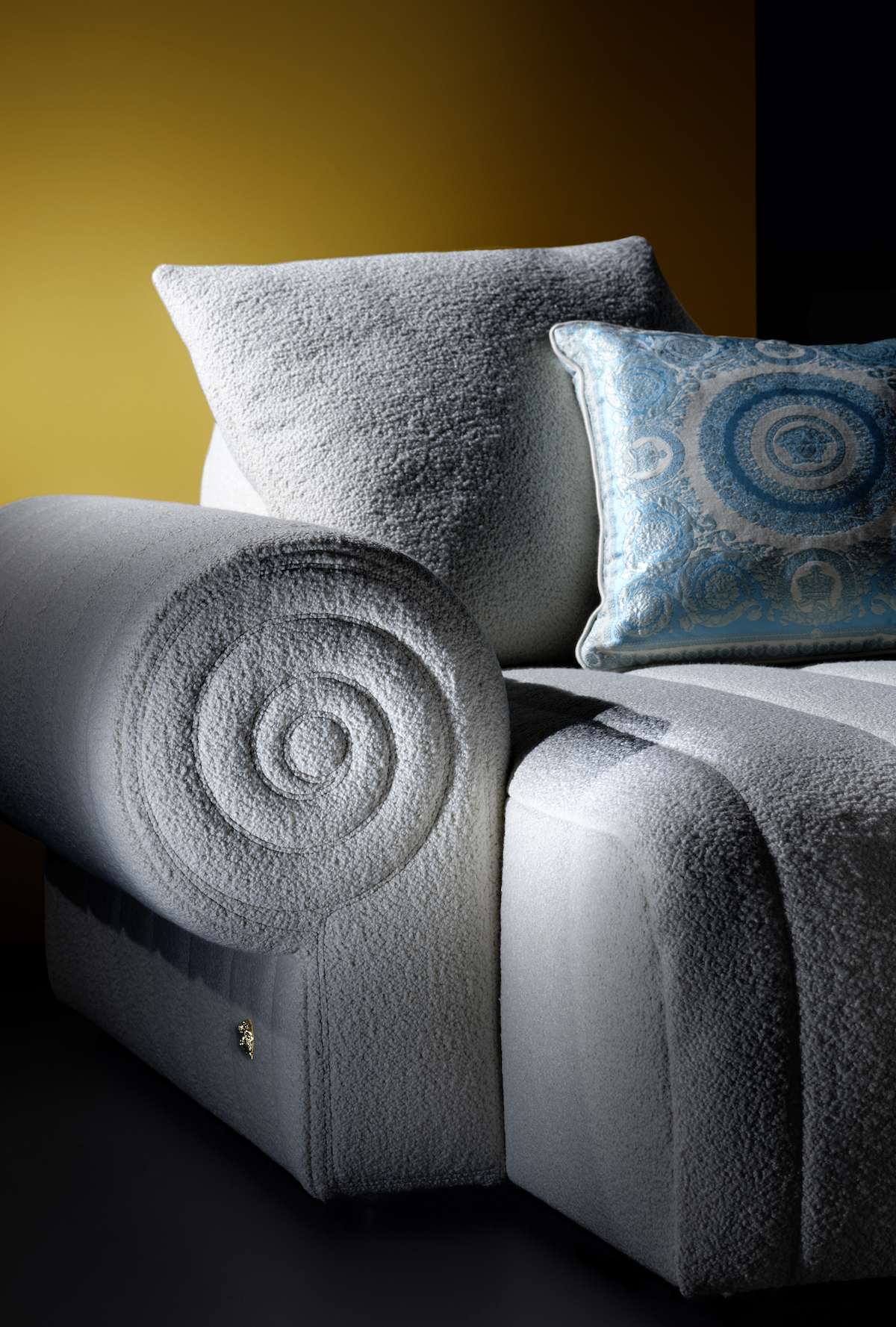
From Versace, the ‘Zensational’ sofa, a perfect portmanteau perfect for a brand entirely comfortable being nothing but fabulous. Launched in a theatrical 500 sq m black box at the Salone fair complete with backlit silk-crepe panels to bring extra drama, the geometric modular seat features the brand’s swirled hallmarks and Medusa head adornment and arrives in crocodile-embossed leather, as well as Baroque-print jacquard. Designed in collaboration with the contemporary architects Roberto Palomba and Ludovica Serafini from PS+A Studio, it is joined by the ‘Discovery’ sofa, table and chair (high-octane extensions of the brand’s ‘Stiletto’ and ‘La Greca’ lines) and the new ‘Goddess’ LED table lamps and ‘Galaxy’ chandelier. The latter features opalescent and gilded spheres and is embossed with the Versace Medusa-head logo.
Hermès
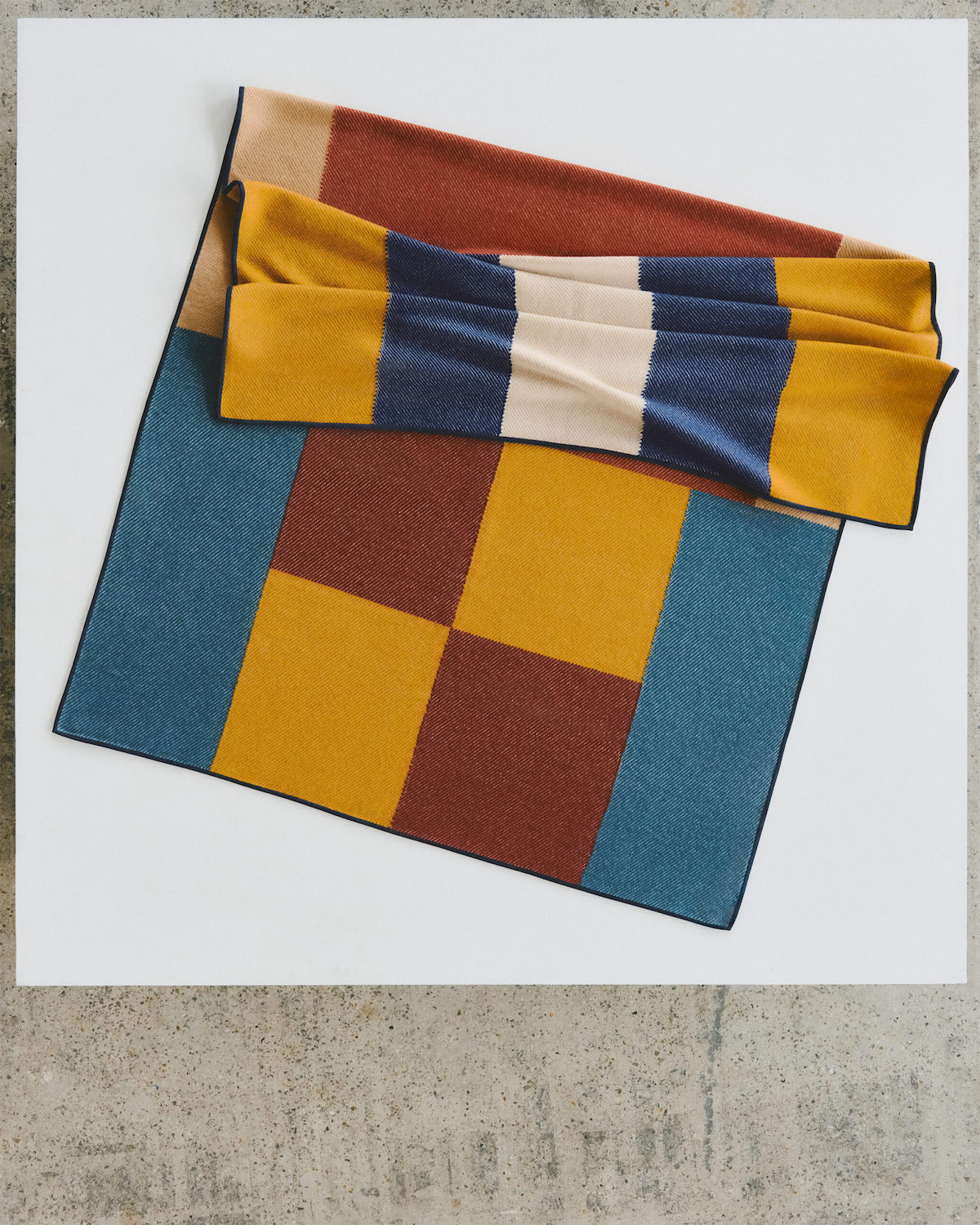
Hermès opted to go minimal in Milan, taking over La Pelota with an iron rod and concrete framework which was engineered to deliberately spurn excess. Inside this gridwork came a collection that riffed on the house’s equestrian motifs, presenting simplicity in the most sublime of ways. The Hermès blankets, crafted from cashmere plaid, were inspired by the house’s archives, resembling a patchwork of the silk scarves worn by jockeys; the Cordélie Arçon rugs depicted fence poles and racetracks, achieved by placing hand stitching woven cord onto linen; porcelain tableware presented freehand illustrations by the artist Jochen Gerner in felt-tip pens; the ‘Contour d’Hermès’ sofa was upholstered in wool and cotton slub canvas with red leather piping; and the ‘Conservatoire’ chair, first introduced by the brand in the 1930s, reappeared in new slimline proportions, as conceived through the lens of Jasper Morrison. For the opening night, a group from contemporary performance artists CND (Centre National de la Danse) light–stepped it around the installation, emphasising Hermès’ message of ‘natural vigour’.
Loro Piana
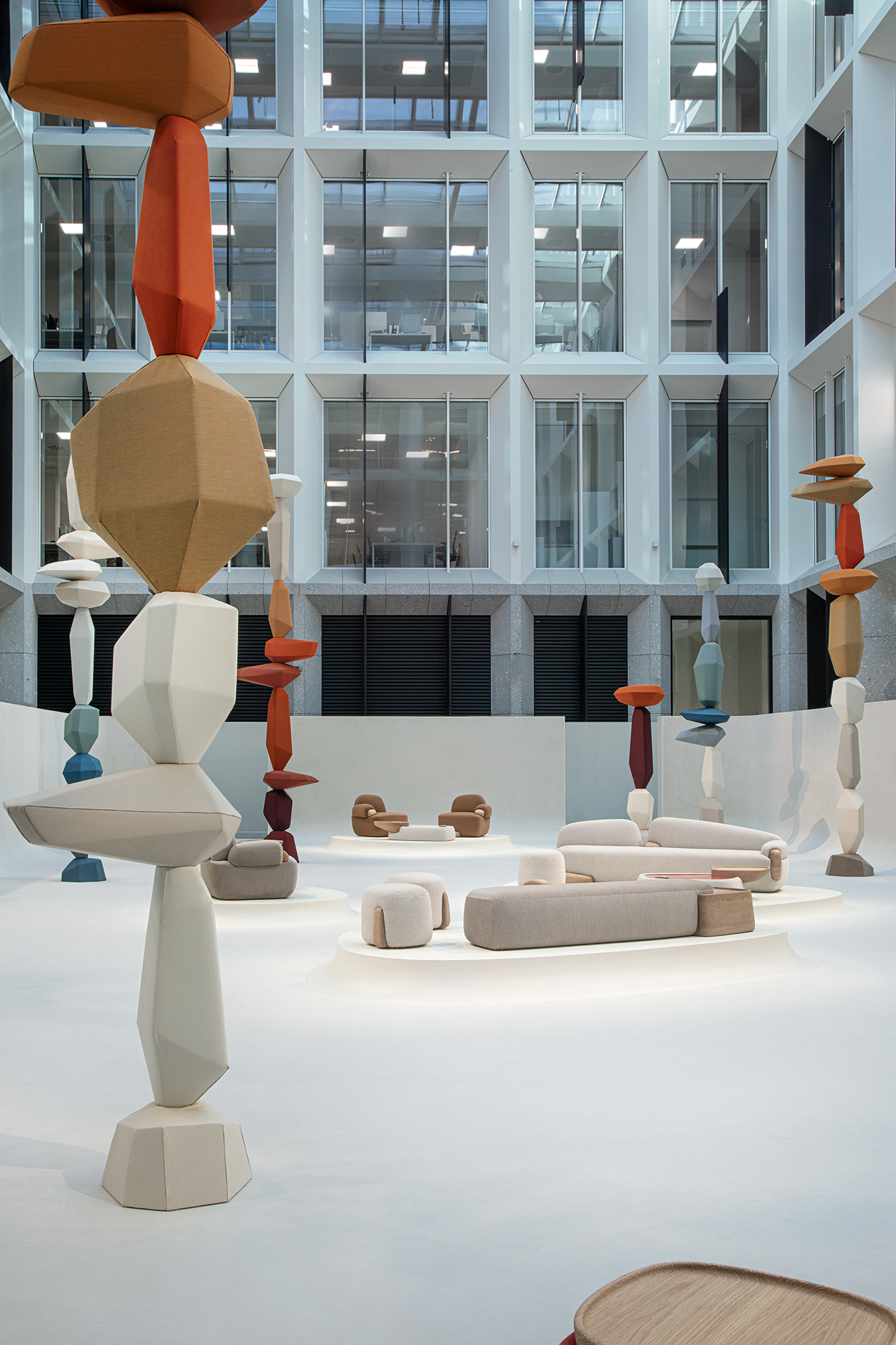
The ancient Andean tradition and art of Apachetas found new resting places at Loro Piana’s Milan HQ as Argentinian designer and artist Cristián Mohaded evoked their majesty and strength in 12 towering eight-metre structures wrapped in the house’s archival interiors fabrics. The tradition for creating these spontaneous monuments comes from travellers crossing vast expanses who would pile stones on top of the other as an ode to the Pachamama, Mother Earth. Here, positioned between Mohaded’s new furniture collection derived from the same stimulus, they symbolised the precious nature of raw materials transformed into items of desire and the importance of preservation. Comprising a sofa, armchairs, a bench, a stool and side tables, the asymmetric collection is crafted from chiselled wood and covered in alpaca suri and wool, undyed raw cashmere, silk velvet and vicuña, the latter also sourced from the province of Catamarca, in the north-west of Argentina where Mohaded was born. Mohaded described it as ‘a unique, dreamy landscape that defies the imagination of each one of those traveling souls, who travel and meet those monumental contractions in the form of towers, alive with color and memory of a living land’. The sentiment was mirrored throughout Fuorisalone, as Mohaded’s Apachetas also popped up at the crossroads of the Brera Botanical Garden in Piazzetta Brera and in the courtyard of the store’s Via Montenapoleone flagship.
Tod’s
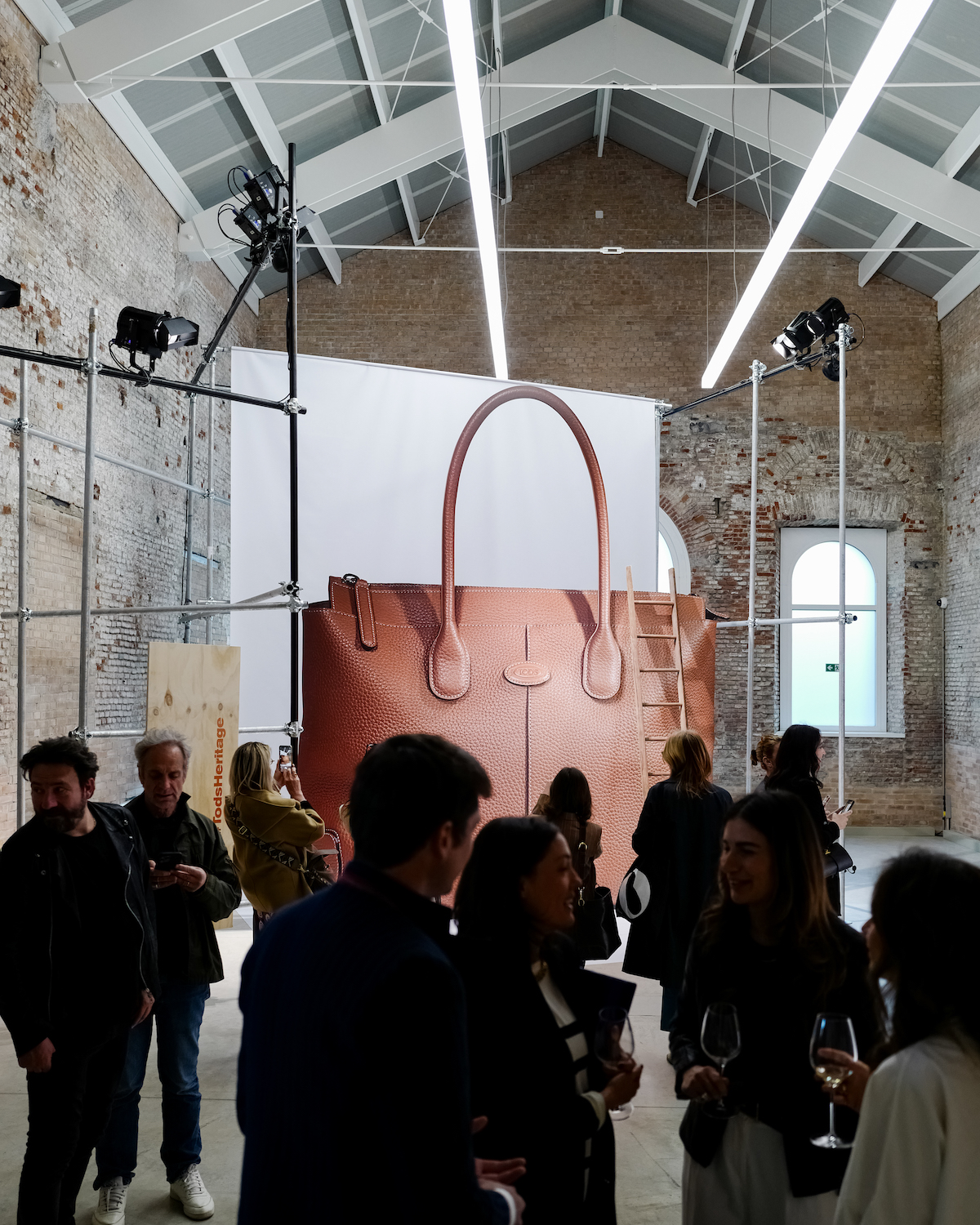
First stop Salone, next stop the world; Tod’s unveiled its collaboration with photographer Tim Walker (‘Tim Walker – The Art of Craftsmanship’) at Le Cavallerizze Museo Nazionale Della Scienza E Della Tecnologia for design week before travelling on to a multi-destination tour. In celebrating the handmade in Italy craftsmanship for which the brand is famed and presenting it through Walker’s trademark fantastical lens, Tod’s CEO Diego Della Valle initiated the project in the hope it will attract more young people to start a career in crafts. ‘They have to understand that craftsmanship is a noble [endeavor] and it makes you free because you can do something with your hands,’ he says. ‘Tim gives us the opportunity to understand this very well [in combining] irony humour and craftsmanship.’ For the project, Walker travelled to Tod’s HQ to see the factory operations in action before choosing key tools and signature items to replicate supersize and shoot in his trademark whimsical way using friends of the brand as models. The result is the hand touch on a super-sized scale. ‘You can see so much happiness in these pictures and there's also encouragement to young people to become craftsmen so to fall in love with this art,’ smiled Delle Valle.
Plan C
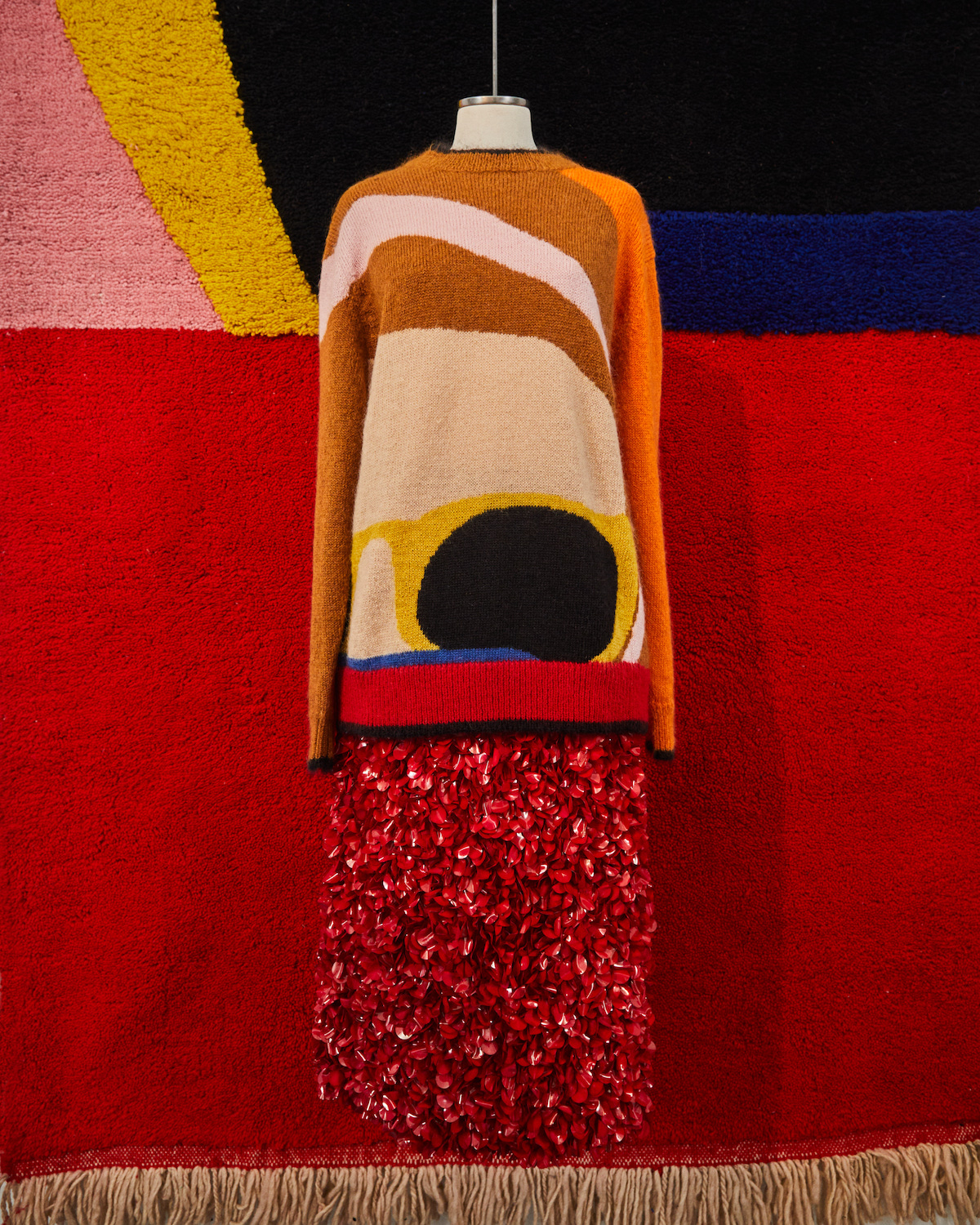
Plan C founder and creative director Carolina Castiglione kept her Salone project in the family, presenting a series of seven resin sculptures modelled on her children, Margherita and Filipo, at the beach and beyond, as well as a self-portrait from the perspective of herself in her rear-view mirror. Realised by the sculptor Livio Caiulo, the sculptures form the springboard for the abstract patterns that have been replicated on Castiglione’s signature block-colour mohair intarsia sweaters and sequinned skirts that accompanied the installation at the Galleria Il Vicolo, just around the corner from Corso Como. The project also saw Castiglione collaborate with the French homeware brand Trame Paris, with whom she worked to design the handwoven wool rugs crafted by artisans in Morocco, their designs again taking inspiration from the motifs of Caiulo’s models. Working and experimenting with proportions, the project combines Castiglione’s love of a multidisciplinary approach. ‘I love designing fashion collections, but at the same time opening to different fields, like visual art and design, give me bigger chances to fully express myself,’ she says. ‘This has always been a key element of my career and I think in the future this will strongly influence the further development of the Plan C brand.’
Brioni
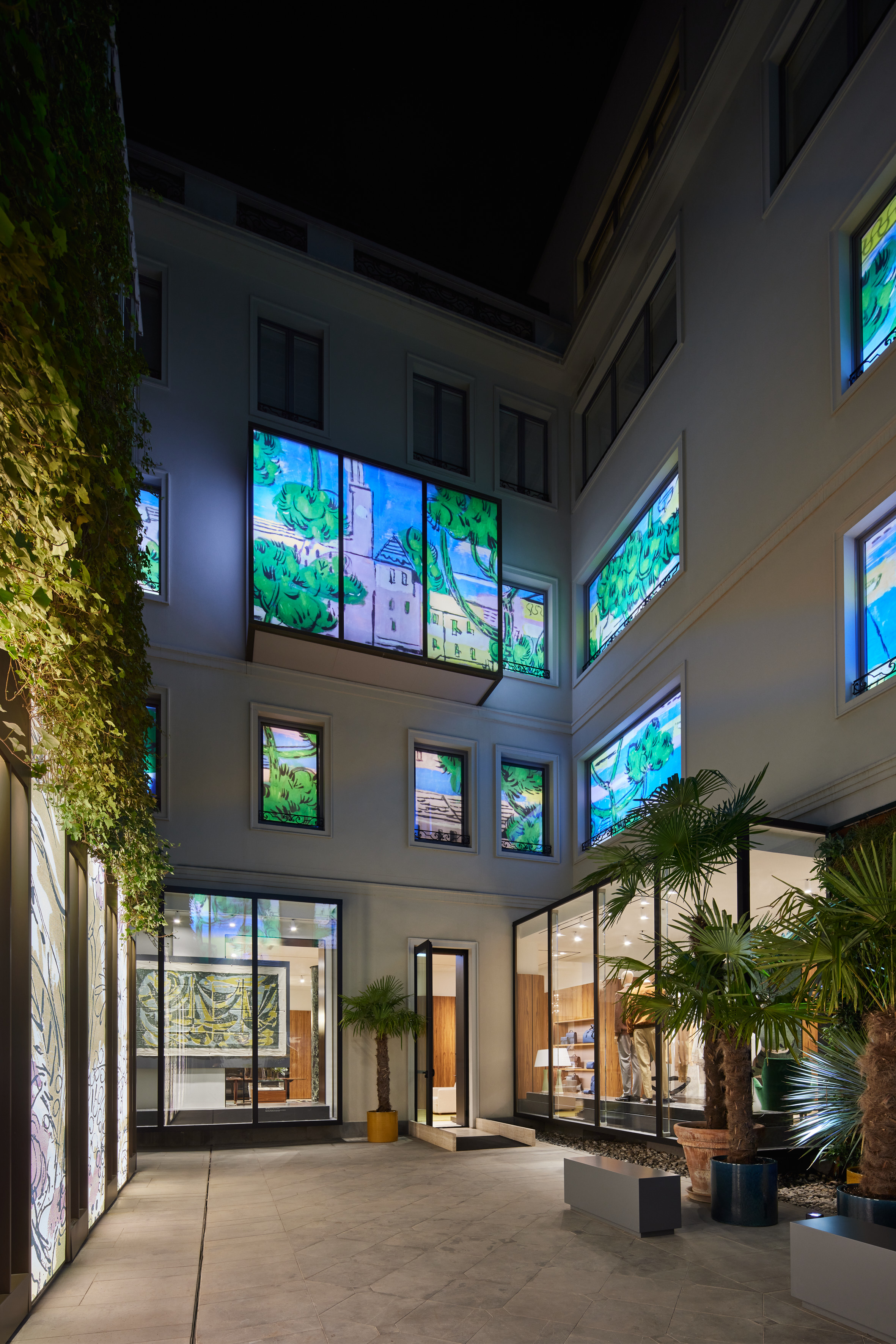
Brioni’s newly reopened Milan flagship came to life at Salone as the rich textile heritage of MITA (Manifattura Italiana Tappeti Artistici) fused with design director Norbert Stumpfl’s impeccable vision of modern luxury craftsmanship to create a celebration of Italy’s finest creativity. The two brands have been collaborators since 2019 when Brioni started to incorporate works, old and new, from MITA into its boutiques around the world to share local touch points for Italy’s most esteemed artists and their works. Here, archival sketches, including Gio Ponti’s 1935 sketch for his ‘Seggioline’ carpet, were presented alongside Enrico Paulucci’s 1952 ‘Alberi’ and Eugenio Carmi’s 1954 ‘Astrazione’. Conceived to present the two brand’s ‘shared spirit of slow luxury’, it contexualised the continued inimitable influence of Italian design and its enduring relevance.
A-POC Able Issey Miyake
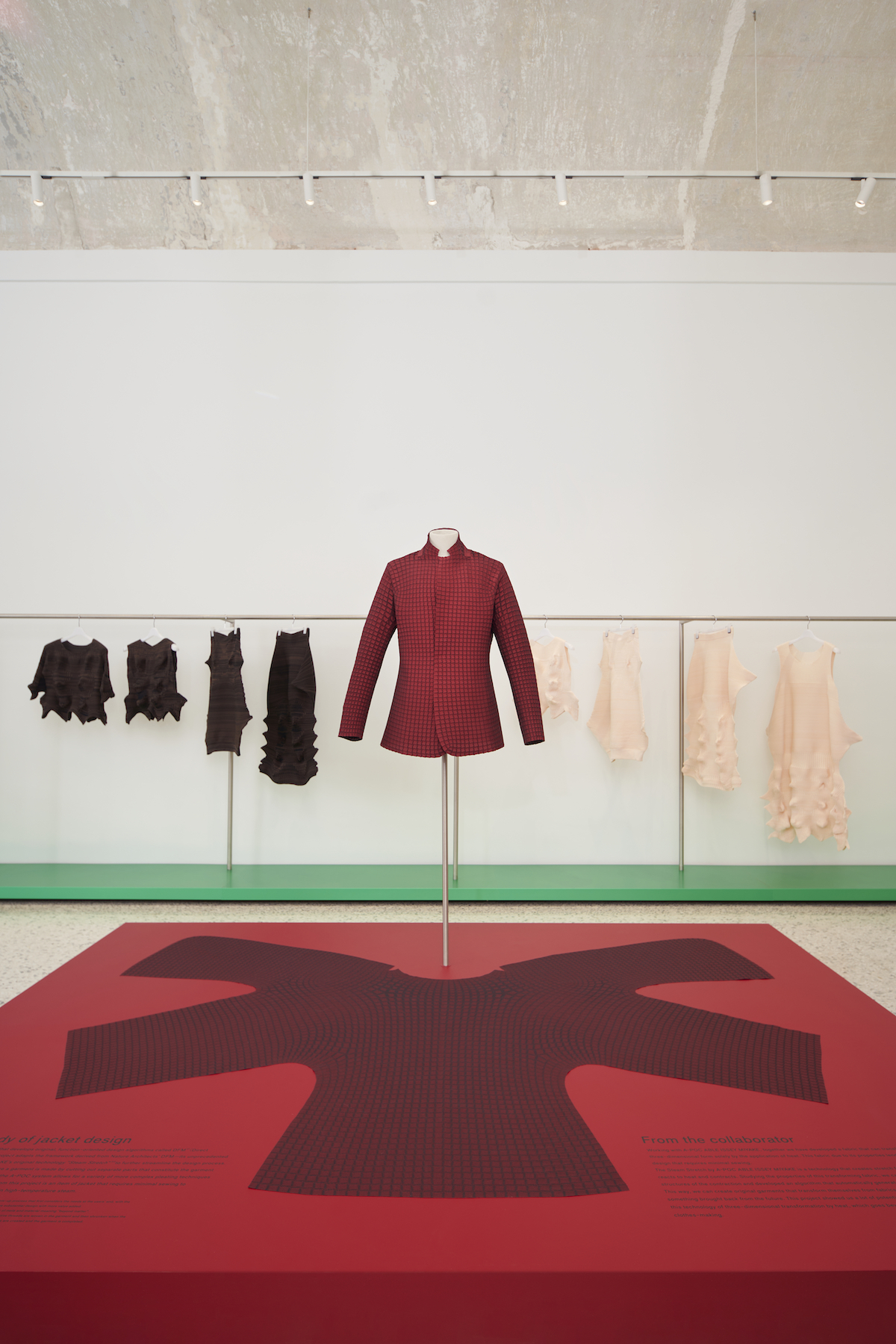
As ever pushing the limits on material innovation, head of A-POC Able Issey Miyake, Yoshiyuki Miyamae, enlisted the design company Nature Architects Inc to incorporate its function-oriented design algorithms DFM (Direct Functional Modelling) which is based on metamaterials (materials comprising elements not found in nature) with Issey Miyake’s own groundbreaking ‘Steam Stretch’ technology. Presenting the fruits of their collaboration alongside architects Taisuke Oshima and Kai Suto at the brand’s Via Bagutta flagship, Miyamae spoke to the importance of collaboration between different interdisciplinary worlds in order to ‘bring about clothing for the next generation’. If their project is scaled, we can expect shapeshifting materials based on the principles of origami that transform from a piece of flat material into a perfectly spherical 3D shape with integrity that will inform not only the future of our clothes but that of domestic design in spearheading architecture. For Salone, the team showed prototypes that included lighting fixtures and skyscrapers – with talk of taking it into the automotive industry and eventually space. It is important, says Miyamae, ‘to think about the possibility of applications. Of course it is important to preserve [tradition], but we are more interested in developing traditions into future materials.’
Loewe

Paper, twine, shearling, leather, emergency insulating foil: Jonathan Anderson’s beloved Welsh stick chairs got a serious makeover for the ‘Loewe Chairs’ installation at Palazzo Isimbardi. Comprising 30 designs (22 of which were sourced from antique dealers and the remaining eight made new for the event), the project brought together expert artisans from both within the Loewe fold and around the world to transform the chair from something humble into something more haute. An avid collector of the stick chair himself, Anderson holds the project close to his heart. ‘I’ve always been obsessed by them; I think they're just such incredible pieces of design,’ he told Wallpaper*. ‘I was like, “Well, how can we take them and use them as a canvas and then fuse the past and the present?” There’s nothing more emotional that when you sit on something or you use something, because it’s about how we interact with something.’
All 30 chairs are for sale, with many already boasting a red sticker by midway through the opening-night cocktail. Not for sale (disappointingly, to many) were the stone structures forming the centrepiece of the Salone presentation. Originally used to form the foundation of traditional Spanish granaries the ‘hórreos’ are each different shape depending on the region from which they came. Here, mushroom caps transformed them into toadstools, another emblem from Anderson’s repertoire, this time his childhood stationery.
Missoni
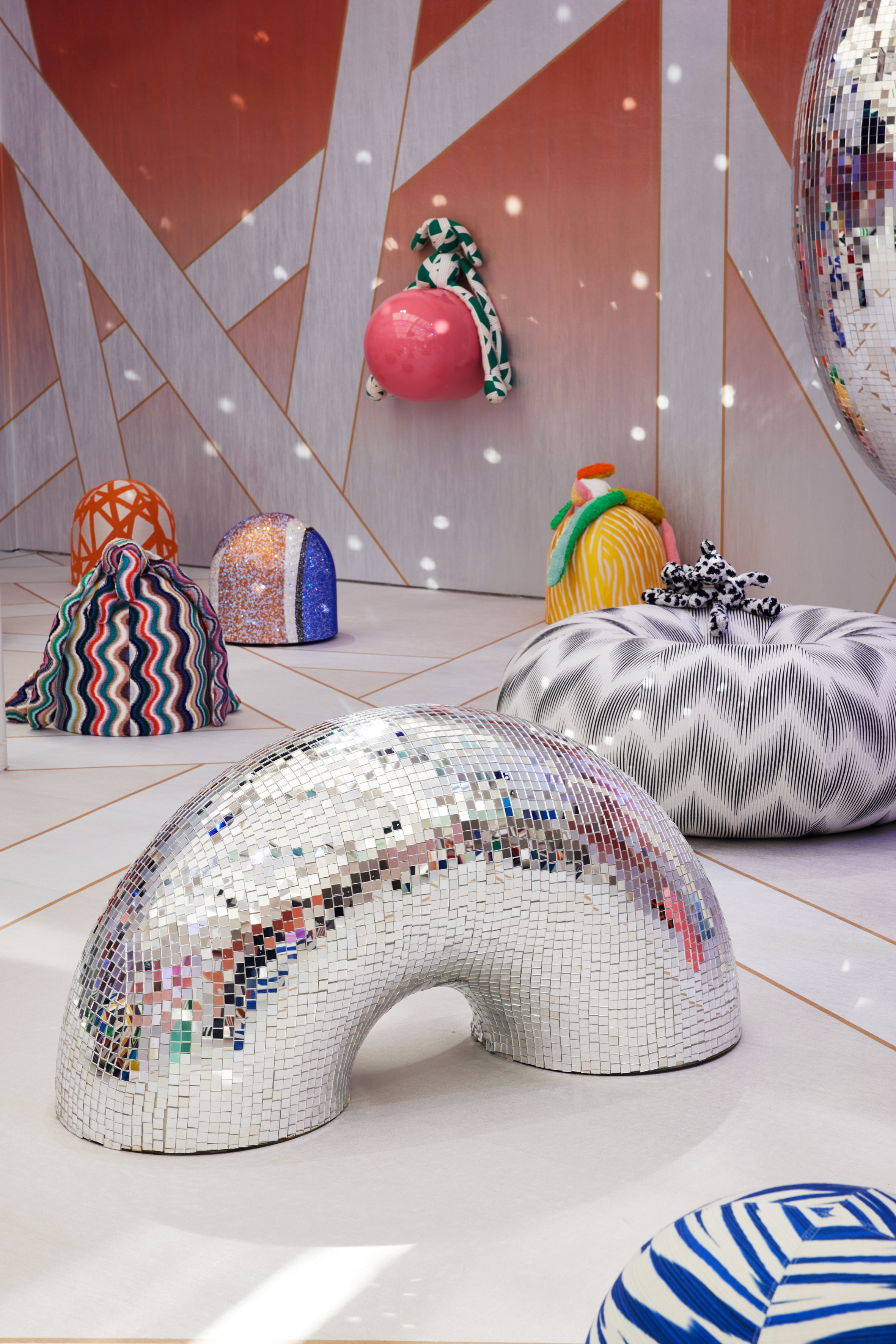
Bringing together Missoni and panettone, two of Lombardy’s most celebrated global exports, was always going to mean a good time at Salone. Missoni Home creative director Alberto Caliri looked to the famous confection to introduce a new shape to the brand’s repertoire – and threw in some doughnuts for good measure. ‘The idea is to work with simple shapes and remember a young, happy life,’ says the designer of the ‘Ciambellone’ and oscillating ‘Panettone’ poufs (all of which were fully occupied by enthusiastic guests). ‘The doughnuts and the panettone are normal to see in Milano,’ he says, adding that he wants to bring ‘a bit of magic to the concrete’. The structures themselves were covered in the house’s signature zigzag jacquards, multicoloured towelling, all-over mirrored mosaic, lacquered resins, and the house’s new motif, the ‘Nastri’ fabric. Comprising six colour variations that combine to create a 3D effect, it stretched from the seating to the new ‘Nastri’ tableware collection, also unveiled this Salone and just as much a joy to behold
Armani / Casa
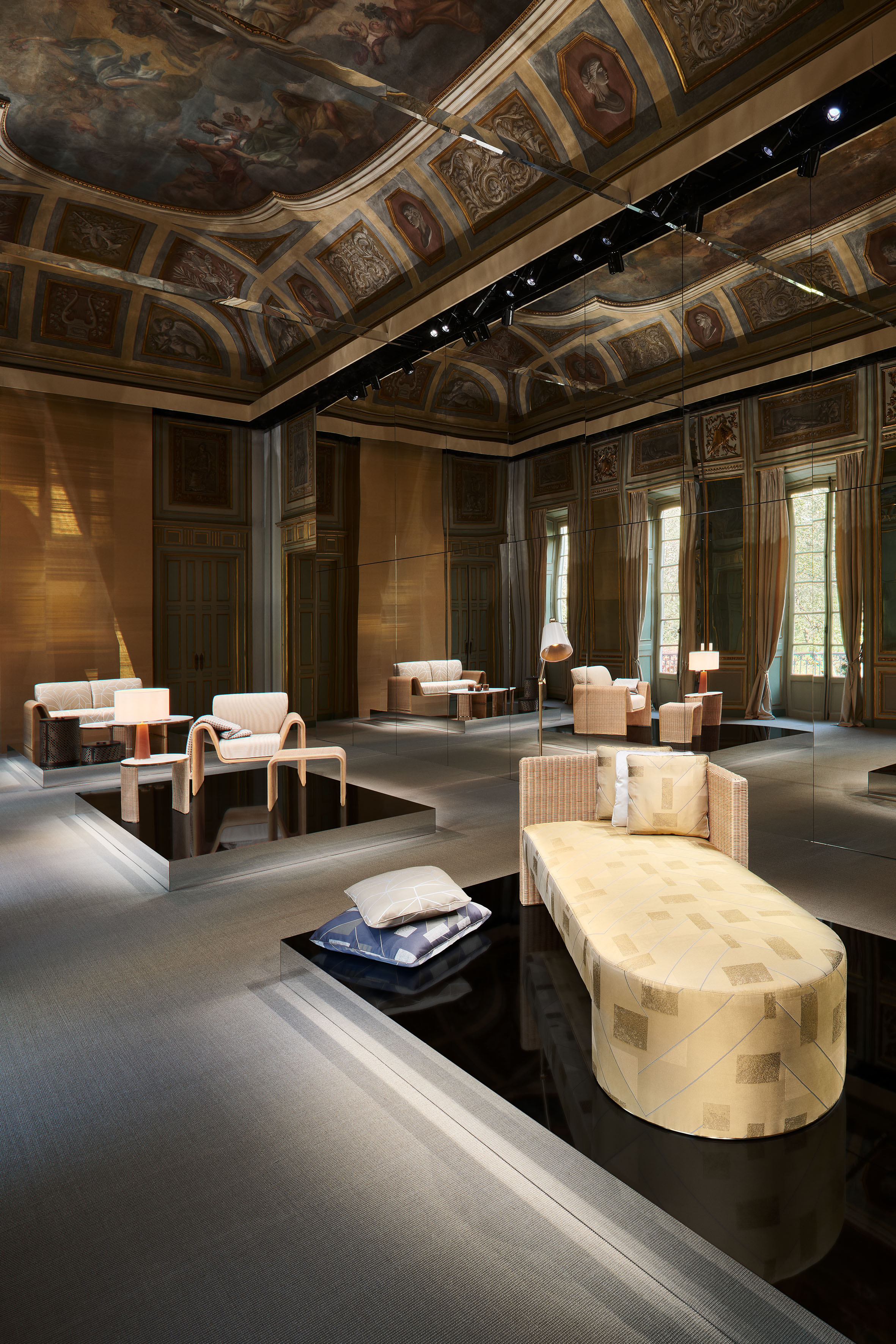
To say the enthusiasm for Giorgio Armani opening his Palazzo Orsini HQ to the public for the first time was palpable would be something of an understatement: the Via Borgonuovo venue counted 1,000 visitors in the first two-and-a-half hours of opening on Tuesday (18 April 2023). They were there to see Armani/Casa’s first ever outdoor collection, a compilation of the ‘Terence’ sofa, the ‘Timothy’ sunlounger, the ’Thomas’ dining table, the ’Turner’ and ‘Terry’ side tables and the ‘Thelma’ folding director’s chair. Carved from teak using a technique that resembles traditional wicker furniture and finished with the multidimensional jacquards for which Armani/Casa is famed, they were positioned in the magical palazzo gardens reached through the porticoes of the 17th-century courtyard. Upstairs at the Palazzo, guests were welcomed into the Appiani-frescoed rooms usually used for haute couture fittings, an apt space to unveil the ‘Antoinette’ dressing table and ‘Camilla’ desk in their new mother-of-pearl renderings. The collection was finished off with the accessories so beloved of the house. This year, tarot cards featuring Armani-clad models and mirrored castanet key rings delivered the annual dose of witty insouciance.
Prada
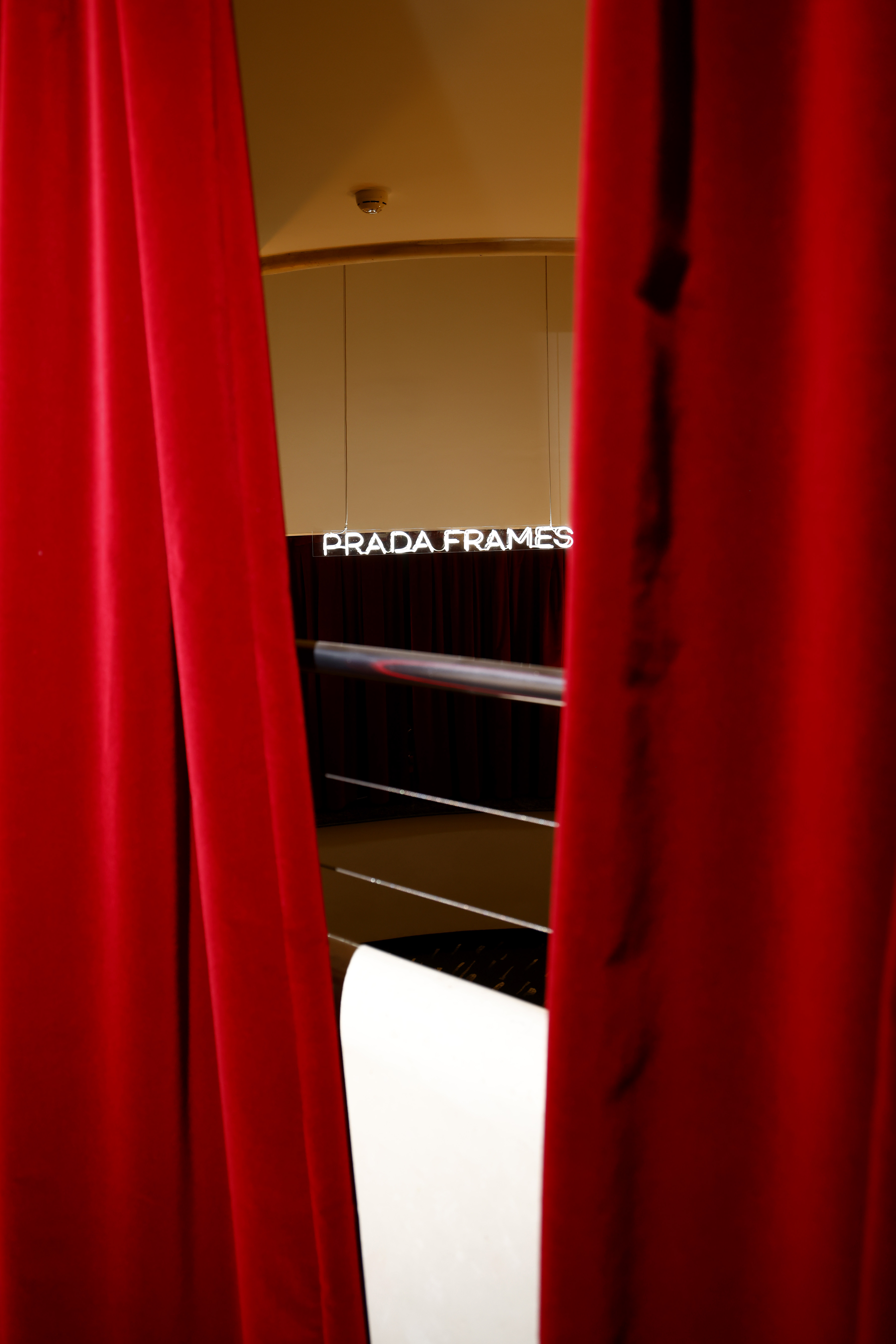
For the second year in a row, Miuccia Prada asked design agency Formafantasma to curate Prada Frames, a symposium that invites the brilliant minds of architects, doctors, designers, psychologists, anthropologists, activists and experts in multiple fields to share their research on the relationship between design and the environment. This year, the theme was ‘Materials in Flux’, where the subject of waste – its origins, its value chain, and its transformative properties – was unpacked in an interrogation of its complexities. Using as a springboard the work of British anthropologist Tim Ingold and his findings that materials are endlessly evolving entities, the man himself kicked off proceedings at the Laveni and Avati-designed Teatro Filodrammatici – with 1960s interiors by Luigi Caccia Dominioni – introducing waste as matter in constant transformation. In the following sessions, waste as a lifeline in global material flows and its role in value systems as well as design was further evaluated and explored.
Dior

To the Palazzo Citterio, where Philippe Starck presented the next verse in his annual ode to Monsieur Dior and the house’s famous ‘Medallion’ chair. This year, Dior by Starck riffed on the ‘Miss Dior’ chair the designer created for last year’s outing with the ‘Miss Dior Sweet Chair’ and the ‘Monsieur Dior’ armchair which he described as being ‘perfectly balanced through these essential notions of gravity and lightness, of yin and yang’. Presented in aluminium, pink, black and fluorescent orange toile de Jouy, the notion came to life with a circular sculptural installation devised in collaboration with Soundwalk Collective that saw the chairs rise and fall in opposing directions as if weightless puppetry. ‘Miss Dior and Monsieur Dior, Catherine and Christian Dior, the sister and the brother, the chair and the armchair, is the story of a sublime complementary duality,’ Starck says of his stimulus. To complete the family, occasional tables and stools were presented, also sculpted and finessed from aluminium. ‘Aluminium is the point zero from which everything is built, the idea of intelligence and purity of technology,’ says Starck. ‘The object as it is in its origin, its essence, without any dross.’
Bottega Veneta
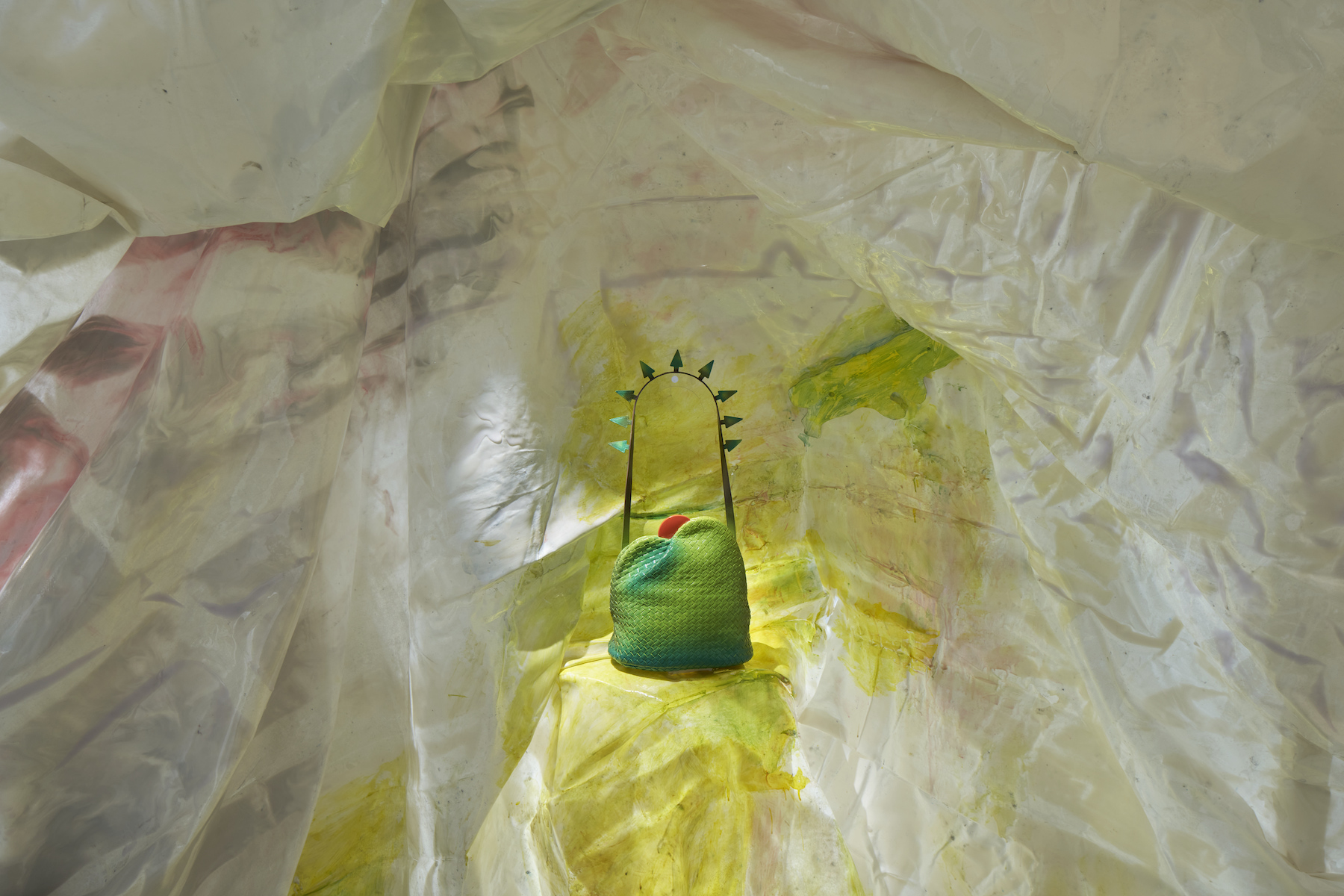
As if Bottega Veneta’s Summer 2023 fashion show wasn’t already one for the history books – that leather lumberjack shirt, those calfskin jeans – its set design collaboration with design maestro Gaetano Pesce, has been immortalised with the duo’s Milan Design Week tie-up. Taking over the house’s entire Via Montenapoleone boutique, Pesce and his team were given creative carte blanche to construct a huge scaffold structure, under which they draped hand-painted canvas, sprayed it in situ with resin, and back-lit it so it became an immersive grotto. Entitled ‘Vieni a Vedere’, meaning ‘come and see’, it draws guests along a womb-like corridor, where Pesce’s first handbags (two extremely limited editions inspired by memories of two mountains meeting in his childhood) are born to the world.
Etro
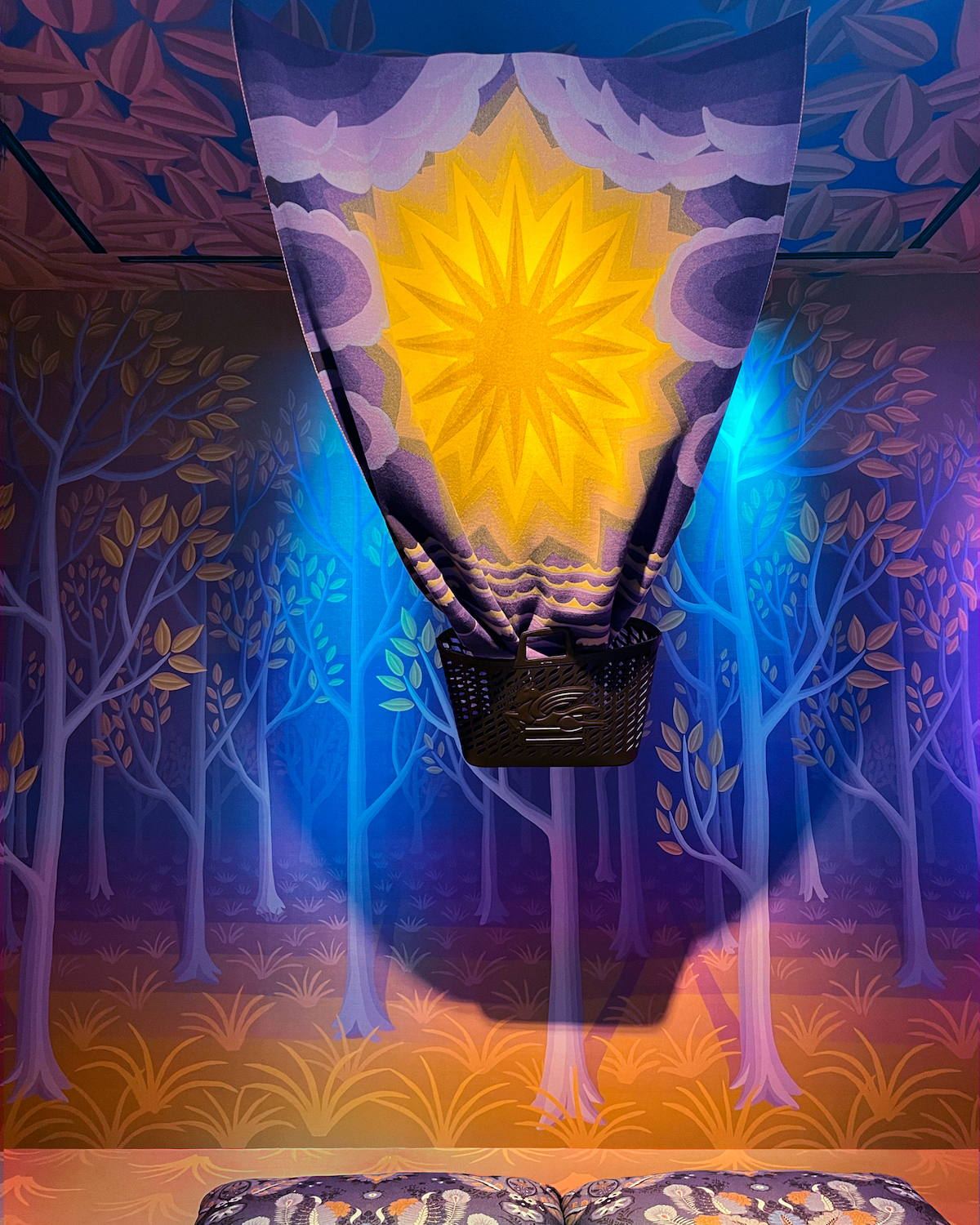
Many an auspicious friendship has been made on Instagram by Marco de Vincenzo, Etro’s creative director. ‘It’s special, because you can find someone who is doing what's in your mind in a different way and it’s an authentic way to connect,’ he tells Wallpaper. A year into his helm at the Italian house famed for its paisley prints and luscious textiles, his recent scrolling saw him land on the page of New York-based painter Amy Lincoln. Drawn to her hypnotic dreamscapes, the designer asked her to work on six tapestry-inspired blankets for their collaboration ‘Woven Spectrum’, presented this week in the brand’s Brera boutique where every inch of every wall is covered in Lincoln’s brushstrokes. Describing their meeting as serendipitous, the pair talked of the positive tension between their mediums that helps ground their work. ‘If I focus too much on fashion, it means business, so sometimes to lose control and to look at something differently, reminds you that fashion is art,’ smiles de Vincenzo. ‘It's important as an artist to not be too influenced by market forces,’ adds Lincoln. ‘I think you want to be able to make enough money to actually live as an artist and be able to make your art, but you also need to make what you feel most connected to and what feels most important.’
Zegna
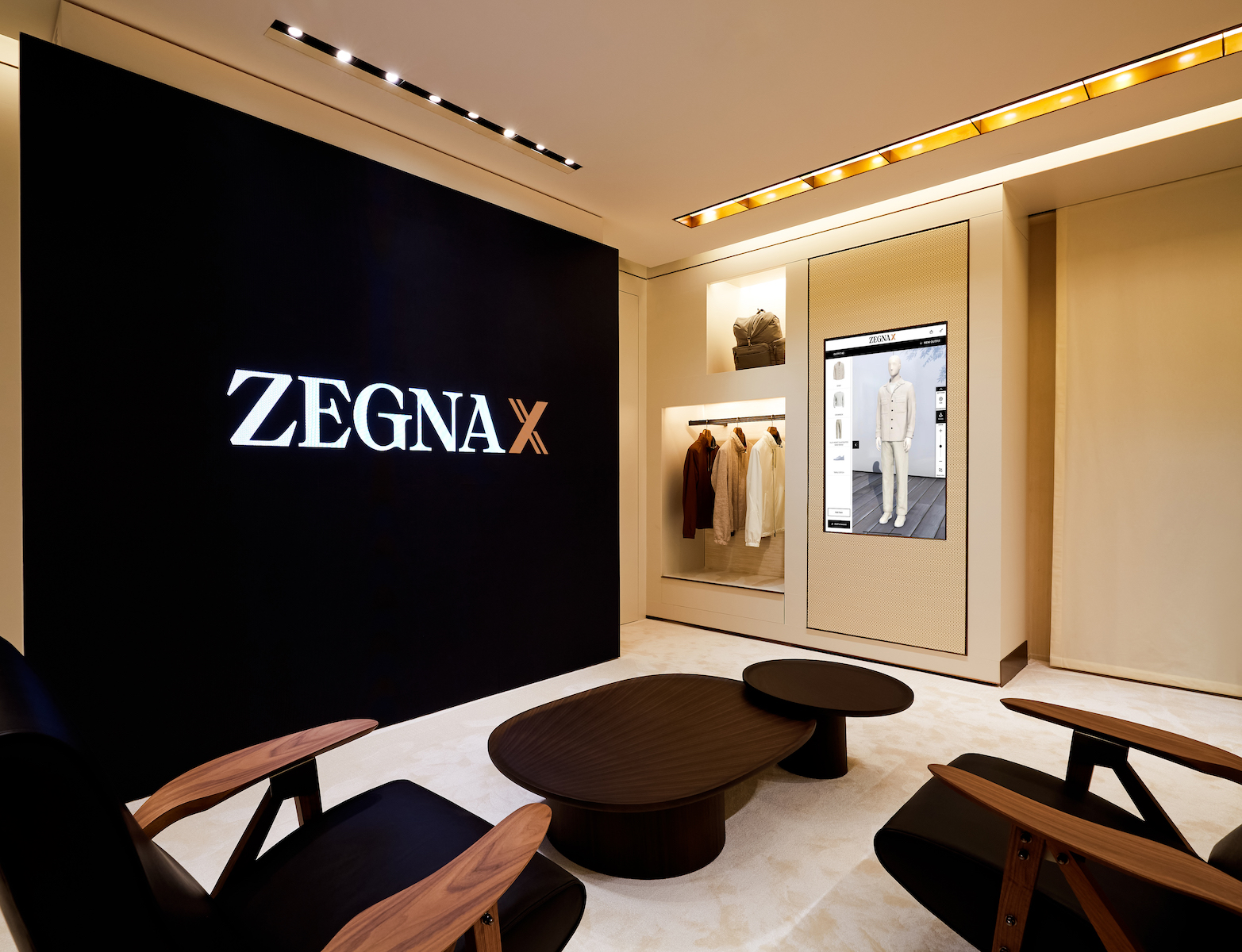
Zegna took the opportunity at Salone to launch its new Zegna X service it has created in collaboration with Microsoft. A state-of-the-art update to its already wildly popular made-to-measure service, a new 3D style generator will gather customers’ and clients’ personal style requirements to generate billions of personalised configurations of luxury leisurewear – 49 billion to be exact. ‘The most expensive thing we have today in our life is time and we have huge customers with amazing wallets and willingness to buy, they just do not have the time to do so,’ said chief marketing and sustainability officer Edoardo Zegna. Available in-store in Milan, next year the plan is to roll it out online so people can be their own armchair stylists. For artistic director Alessandro Sartori, the technology is a complement to the traditional tailoring he and the house are famed for. ‘It’s giving me more options and information to play with of course,’ he said. ‘Before, we had good information, but not at this level.’
Stay tuned for more fashion moments at Salone del Mobile and Milan Design Week 2023.
Scarlett Conlon a freelance journalist and consultant specialising in fashion, design and lifestyle. Before relocating to Italy, she held roles as deputy fashion editor at The Guardian and Observer and news editor at British Vogue in London. She is currently a regular contributor Wallpaper* Magazine among other prominent international fashion and design titles.
-
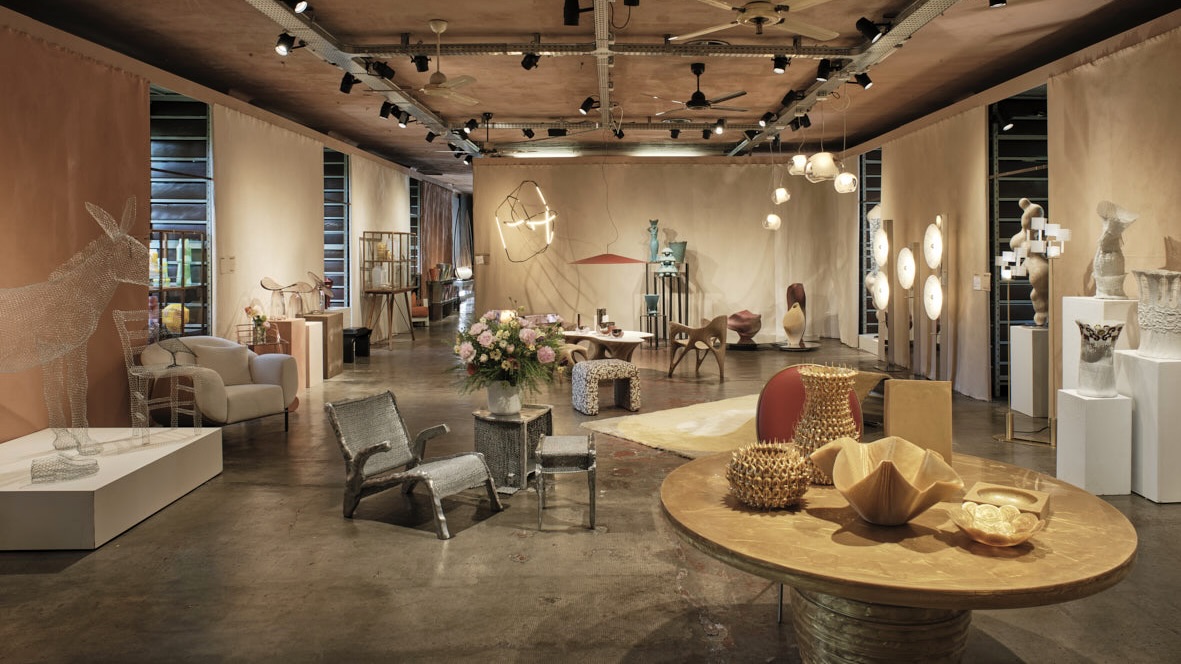 Eight designers to know from Rossana Orlandi Gallery’s Milan Design Week 2025 exhibition
Eight designers to know from Rossana Orlandi Gallery’s Milan Design Week 2025 exhibitionWallpaper’s highlights from the mega-exhibition at Rossana Orlandi Gallery include some of the most compelling names in design today
By Anna Solomon
-
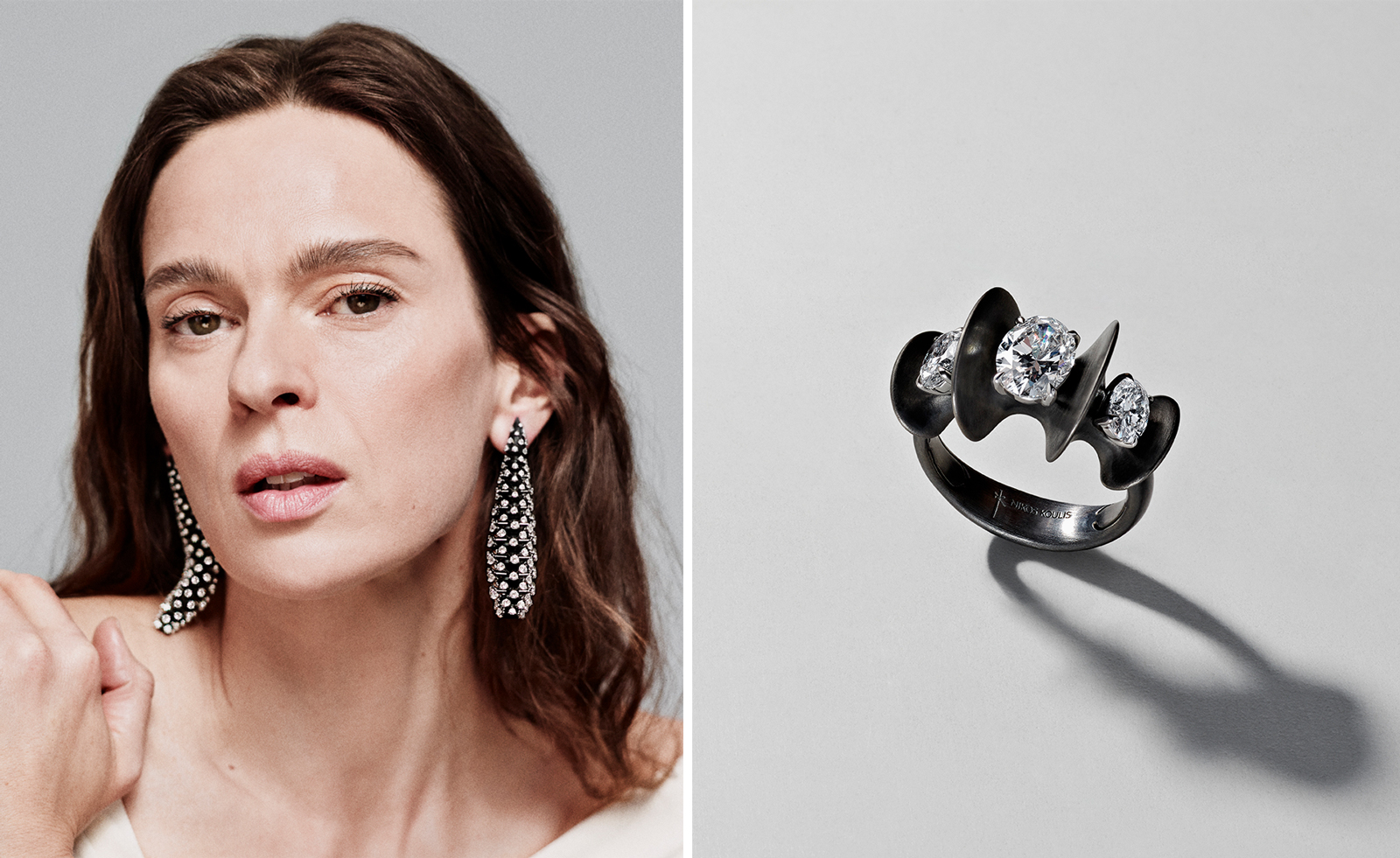 Nikos Koulis brings a cool wearability to high jewellery
Nikos Koulis brings a cool wearability to high jewelleryNikos Koulis experiments with unusual diamond cuts and modern materials in a new collection, ‘Wish’
By Hannah Silver
-
 A Xingfa cement factory’s reimagining breathes new life into an abandoned industrial site
A Xingfa cement factory’s reimagining breathes new life into an abandoned industrial siteWe tour the Xingfa cement factory in China, where a redesign by landscape specialist SWA Group completely transforms an old industrial site into a lush park
By Daven Wu